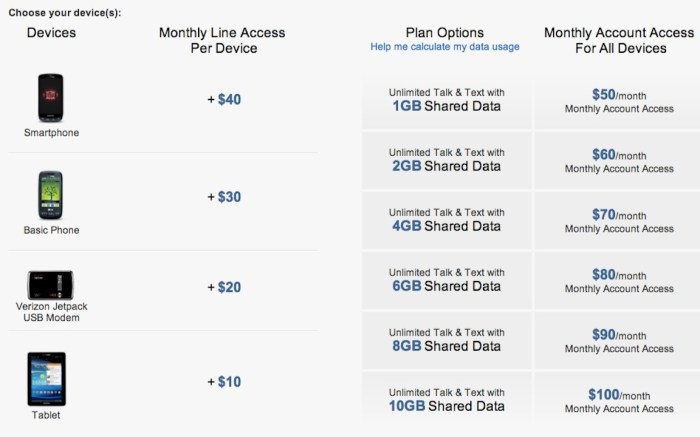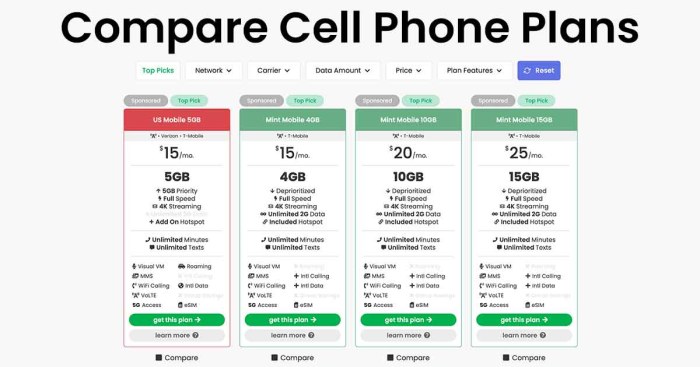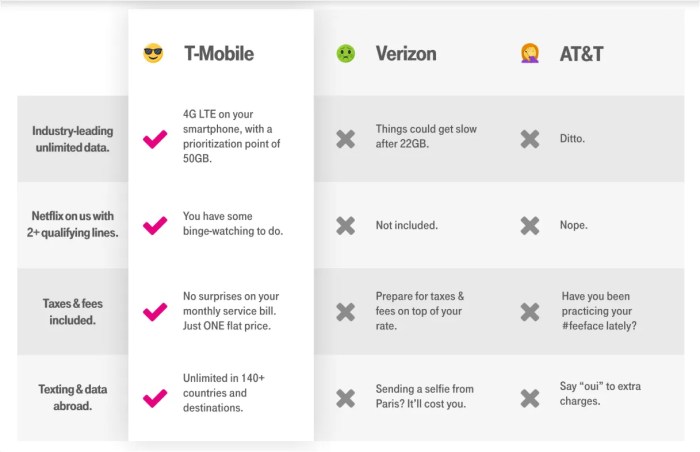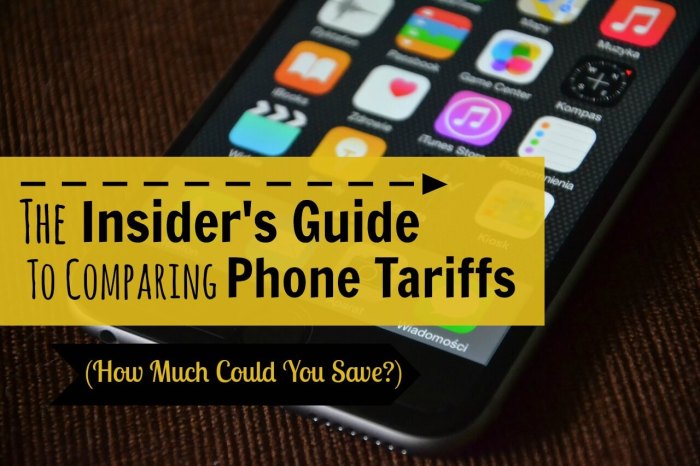Grace is comparing cell phone plans, an essential aspect of managing mobile phone expenses, offers customers flexibility and potential savings. This guide provides an in-depth analysis of grace periods, exploring their benefits, types, and strategies for negotiating with providers.
Understanding grace periods empowers consumers to make informed decisions, avoid unnecessary fees, and optimize their cell phone usage.
Introduction

A grace period, in the context of cell phone plans, refers to an additional period of time granted to customers beyond the due date of their monthly bill, during which they can continue to use their services without incurring late fees or service interruptions.
Grace periods can benefit customers by providing them with a buffer period to avoid penalties or service disruptions due to unforeseen circumstances, such as financial difficulties, forgetfulness, or unexpected expenses.
Types of Grace Periods
Different cell phone providers offer varying types of grace periods, including:
- Standard Grace Period:A fixed period, typically ranging from 5 to 15 days, after the due date during which customers can make a payment without incurring late fees.
- Extended Grace Period:A longer grace period, often offered to customers with a good payment history or those who have experienced extenuating circumstances.
- Flexible Grace Period:A grace period that can be adjusted based on individual customer needs, allowing for more personalized payment arrangements.
Grace Periods for Late Payments: Grace Is Comparing Cell Phone Plans

Grace periods for late payments are a common feature of many cell phone plans. They allow customers to make a late payment without incurring a late payment fee. Grace periods can be helpful for customers who experience unexpected financial difficulties or who simply forget to pay their bill on time.
Tips for Requesting a Grace Period
- Contact your cell phone provider as soon as possible after you realize you will be late with your payment.
- Explain your situation and why you need a grace period.
- Be polite and respectful, even if you are frustrated with the situation.
- If you have a good payment history, your cell phone provider may be more likely to grant you a grace period.
Grace Periods for Contract Cancellations
Cell phone providers often charge contract cancellation fees to customers who terminate their contracts before the end of the agreed-upon term. These fees can vary depending on the provider and the length of time remaining on the contract. Grace periods can help customers avoid or reduce these fees by providing a window of time during which they can cancel their contracts without penalty.
Types of Contract Cancellation Fees
- Early Termination Fee (ETF):A flat fee charged for canceling a contract before the end of the term.
- Prorated ETF:A fee calculated based on the remaining time left on the contract.
- Device Repayment Fee:A fee charged for devices that are financed through the provider and not yet paid off.
Benefits of Grace Periods, Grace is comparing cell phone plans
Grace periods can provide several benefits to customers:
- Avoid Cancellation Fees:Customers who cancel their contracts within the grace period can avoid paying any cancellation fees.
- Reduce Cancellation Fees:For contracts with prorated ETFs, customers who cancel within the grace period will pay a lower fee.
- Provide Time to Consider Options:Grace periods give customers time to reconsider their decision to cancel and explore other options, such as switching providers or negotiating a new contract.
Examples of Grace Periods
Grace periods for contract cancellations vary depending on the provider. Some common examples include:
- AT&T:14-day grace period for all contracts.
- Verizon:15-day grace period for contracts with ETFs.
- T-Mobile:20-day grace period for all contracts.
4. Grace Periods for Data Usage

Grace periods for data usage can provide customers with a buffer zone to avoid exceeding their data limits and incurring overage charges. These grace periods allow customers to continue using data services even after they have reached their monthly data limit, typically at a reduced speed or with limited functionality.
There are different types of grace periods for data usage offered by cell phone providers. Some providers offer a fixed grace period, such as an additional 1GB of data after reaching the monthly limit. Others offer a dynamic grace period that adjusts based on the customer’s usage patterns and account history.
For example, a customer who consistently uses less than their monthly data limit may be granted a larger grace period than a customer who frequently exceeds their limit.
Tips for Managing Data Usage
- Monitor your data usage regularly through your provider’s online portal or mobile app.
- Set data usage alerts to notify you when you are approaching your data limit.
- Use Wi-Fi whenever possible to reduce cellular data usage.
- Disable automatic updates for apps and software.
- Compress data usage by enabling data compression features on your device or through your provider.
5. Comparing Grace Periods Across Providers

When comparing grace periods, customers should consider the following factors:
- The type of grace period: Some providers offer grace periods for late payments, while others offer grace periods for contract cancellations or data usage.
- The length of the grace period: Grace periods can range from a few days to a month or more.
- Any restrictions or limitations: Some providers may restrict grace periods to certain types of accounts or plans.
Table: Grace Periods Offered by Different Cell Phone Providers
| Provider | Type of Grace Period | Length of Grace Period | Restrictions or Limitations |
|---|---|---|---|
| Verizon | Late payments | 10 days | None |
| AT&T | Late payments | 15 days | None |
| T-Mobile | Late payments | 21 days | None |
| Sprint | Late payments | 30 days | None |
| Cricket Wireless | Late payments | 10 days | Only for customers with automatic payments |
| Boost Mobile | Late payments | 15 days | Only for customers with a valid payment method on file |
| MetroPCS | Late payments | 30 days | Only for customers with a valid payment method on file |
6. Negotiating Grace Periods
Customers can negotiate grace periods with their cell phone providers by contacting customer service and explaining their situation. It’s important to be polite and respectful, and to provide a clear and concise explanation of why you need a grace period.
You should also be prepared to provide documentation to support your request, such as a proof of income or a letter from your employer.
If you are successful in negotiating a grace period, it’s important to make sure that you understand the terms of the agreement. Be sure to ask about the length of the grace period, the amount of time you have to pay your bill before it is considered late, and any other conditions that may apply.
Tips for Negotiating Grace Periods
- Be polite and respectful.
- Provide a clear and concise explanation of why you need a grace period.
- Be prepared to provide documentation to support your request.
- Ask about the length of the grace period, the amount of time you have to pay your bill before it is considered late, and any other conditions that may apply.
Potential Benefits and Drawbacks of Negotiating Grace Periods
Benefits
- Can help you avoid late fees.
- Can give you more time to pay your bill.
- Can help you improve your credit score.
Drawbacks
- May not be available from all providers.
- May require you to provide documentation to support your request.
- May not be granted for all reasons.
Conclusion
Grace periods are an important part of cell phone plans, providing customers with flexibility and peace of mind. By understanding the different types of grace periods and how they work, customers can make the most of these benefits. When choosing a cell phone plan, it is important to compare the grace periods offered by different providers to find the best fit for individual needs.
In addition, customers should be aware of their rights and responsibilities regarding grace periods. If a customer is unable to make a payment on time, they should contact their provider immediately to discuss payment arrangements. Customers should also be aware that grace periods do not apply to all situations, such as contract cancellations.
By being informed and proactive, customers can ensure that they are taking full advantage of the grace periods offered by their cell phone provider.
FAQ
What is a grace period for a cell phone plan?
A grace period is an additional period of time beyond the due date during which a payment can be made without incurring late fees or penalties.
How can grace periods benefit cell phone customers?
Grace periods provide customers with a buffer against late payments, allowing them to avoid fees and maintain their service without interruption.
What are the different types of grace periods offered by cell phone providers?
Grace periods can vary in length and may apply to late payments, contract cancellations, and data usage.